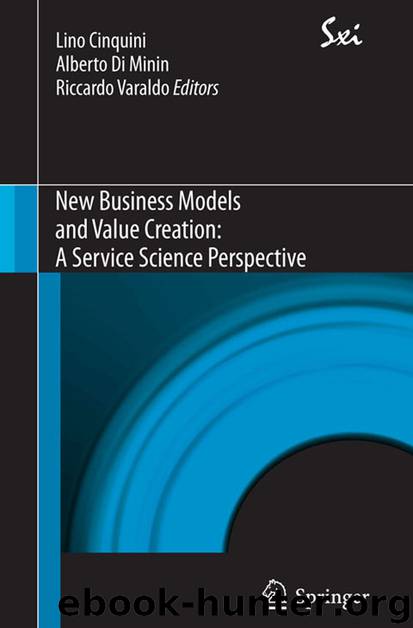New Business Models and Value Creation: A Service Science Perspective by Lino Cinquini Alberto Di Minin & Riccardo Varaldo

Author:Lino Cinquini, Alberto Di Minin & Riccardo Varaldo
Language: eng
Format: epub
Publisher: Springer Milan, Milano
6.1.3 6.1.3 Service as a business logic: service-dominant logic
The recent service-dominant approach broadens the interpretation of service. (Vargo and Lusch 2004), referring in particular to marketing studies, sustain that “New perspectives converge to form a new dominant logic for marketing, where the provision of services rather than goods is fundamental for economic exchange”. Relationships with customers, intangible goods and cocreating value with the customer, in fact, form the basis of the production of services (Vargo and Lusch 2004). In this perspective, all firms are ultimately service companies, thus obeying the service-dominant logic. The quality of customer interaction is fundamental to the competitive success of the contemporary firm. The concept of cocreating value is intended as customer participation and consideration of their contribution in one of the stages that characterise the implementation of the offer (value proposition): design, implementation and post-sales. Involvement can have consequences for the exploration of trends, the creation of a need and its satisfaction, and contributes to the acceptance and success of a firm’s value proposition (Merli et al. 2010, pp. 128 ff.).
(Vargo and Lusch 2004, 2008) define services as “the application of specialised competencies (knowledge and ability) through actions, processes and performance to benefit another entity or the entity itself”. In this approach, the service (rather than the product) creates a benefit for the customer and goods are interpreted accordingly as mere tools or mechanisms for the distribution of the service provision. Service, therefore, constitutes the general case, the common denominator of the exchange process: in reality, it is service that is always exchanged, while goods, when they are used, constitute a support in the service delivery process.
Consequently, (Vargo and Lusch 2008) make some fundamental assertions as the basis of the emergent logic that is dominated by service (service-dominant logic), which is set against the traditional logic that is dominated by goods (goods-dominant logic):In terms of the economic system, service is the fundamental basis of exchange (services are exchanged for services, service represents affluence, a physical good is only its wrapping); physical goods are only a mechanisms for the distribution of services, in the sense that they derive their value from use, or rather, from the service they provide. Hence all economies are fundamentally service economies.
Download
This site does not store any files on its server. We only index and link to content provided by other sites. Please contact the content providers to delete copyright contents if any and email us, we'll remove relevant links or contents immediately.
International Integration of the Brazilian Economy by Elias C. Grivoyannis(110233)
The Radium Girls by Kate Moore(12018)
Turbulence by E. J. Noyes(8040)
Nudge - Improving Decisions about Health, Wealth, and Happiness by Thaler Sunstein(7693)
The Black Swan by Nassim Nicholas Taleb(7109)
Rich Dad Poor Dad by Robert T. Kiyosaki(6612)
Pioneering Portfolio Management by David F. Swensen(6289)
Man-made Catastrophes and Risk Information Concealment by Dmitry Chernov & Didier Sornette(6007)
Zero to One by Peter Thiel(5787)
Secrecy World by Jake Bernstein(4741)
Millionaire: The Philanderer, Gambler, and Duelist Who Invented Modern Finance by Janet Gleeson(4468)
The Age of Surveillance Capitalism by Shoshana Zuboff(4277)
Skin in the Game by Nassim Nicholas Taleb(4239)
The Money Culture by Michael Lewis(4198)
Bullshit Jobs by David Graeber(4179)
Skin in the Game: Hidden Asymmetries in Daily Life by Nassim Nicholas Taleb(3991)
The Dhandho Investor by Mohnish Pabrai(3759)
The Wisdom of Finance by Mihir Desai(3735)
Blockchain Basics by Daniel Drescher(3574)
